| Listing 1 - 10 of 19 | << page >> |
Sort by
|
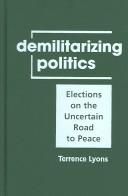
ISBN: 1588263932 1588269671 9781588269676 9781588263933 Year: 2005 Publisher: Boulder, Colo Rienner
Abstract | Keywords | Export | Availability | Bookmark
 Loading...
Loading...Choose an application
- Reference Manager
- EndNote
- RefWorks (Direct export to RefWorks)
With the increasing use of elections as a tool for peacebuilding after civil war, the question of why some postconflict elections succeed and others fail is a crucial one. Tackling this question, Terrence Lyons finds the answer in the internal political dynamics that occur between the cease-fire and the voting. Lyons shows that the promise of elections can provide the incentive for the demilitarization of politics—-he transformation of institutions made powerful by war into those capable of sustaining peace—so that warring parties will in fact choose to change their strategies and adapt to peaceful electoral competition. It is this process of demilitarization that is in turn key to meaningful elections; elections alone, as has been seen repeatedly, are not enough to advance the dual goals of peace and democracy. Incorporating evidence from a range of recent cases, Demilitarizing Politics offers a concrete strategy for peaceful change that can be implemented, and that can make a difference.
International movements --- Political systems --- Peaceful settlement of international disputes --- Internal politics --- Law of treaties --- Elections --- Conflict management --- Peace-building --- Democracy --- 856.6 Vredesopbouw --- 841.1 Democratisering --- Electoral politics --- Franchise --- Polls --- Political science --- Politics, Practical --- Plebiscite --- Political campaigns --- Representative government and representation
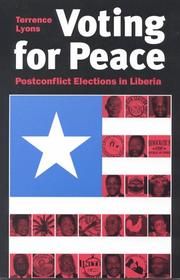
ISBN: 0815753535 Year: 1999 Publisher: Washington, D.C. Brooking Institution Press
Abstract | Keywords | Export | Availability | Bookmark
 Loading...
Loading...Choose an application
- Reference Manager
- EndNote
- RefWorks (Direct export to RefWorks)
Book
ISBN: 1626378339 Year: 2019 Publisher: Boulder, Colorado ; London : Lynne Rienner Publishers,
Abstract | Keywords | Export | Availability | Bookmark
 Loading...
Loading...Choose an application
- Reference Manager
- EndNote
- RefWorks (Direct export to RefWorks)
How did a group with its origins in a small Marxist-Leninist insurgency in northern Ethiopia transform itself into a party (the EPRDF) with eight million members and a hierarchy that links even the smallest Ethiopian village to the center? How do the legacies of protracted civil war and rebel victory over the brutal Derg regime continue to shape contemporary Ethiopian politics? And can the EPRDF, after widespread protests and a state of emergency, transform itself under new leadership to meet popular demands? Answering these questions in his comprehensive study of nearly three decades of Ethiopian politics, Terrence Lyons argues that the very structures that enabled the ruling party to overcome the challenges of a war-to-peace transition are the source of the challenges that it faces now. While the new political leadership has promised dramatic reforms, Lyons observes, the powerful authoritarian ruling party remains in place, unreconstructed.
Book
ISBN: 9781626378339 Year: 2019 Publisher: Boulder
Abstract | Keywords | Export | Availability | Bookmark
 Loading...
Loading...Choose an application
- Reference Manager
- EndNote
- RefWorks (Direct export to RefWorks)
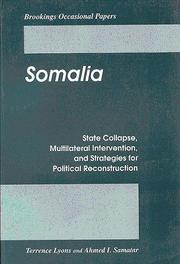
ISBN: 0815753519 Year: 1995 Volume: *4 Publisher: Washington, D.C. The Brookings Institution
Abstract | Keywords | Export | Availability | Bookmark
 Loading...
Loading...Choose an application
- Reference Manager
- EndNote
- RefWorks (Direct export to RefWorks)
Operation Restore Hope, 1992-1993 --- Internal politics --- Somalia --- Politics and government --- 1960 --- -Clans --- United Nations --- Armed Forces --- United States --- Foreign relations

ISBN: 155587990X 1555879667 Year: 2001 Publisher: Boulder, Colo. Lynne Rienner Publishers
Abstract | Keywords | Export | Availability | Bookmark
 Loading...
Loading...Choose an application
- Reference Manager
- EndNote
- RefWorks (Direct export to RefWorks)
Geopolitics --- Géopolitique --- Africa --- Afrique --- Foreign relations --- Strategic aspects --- Relations extérieures --- Aspect stratégique --- International relations. Foreign policy
Book
ISBN: 9781849041850 9781849041751 184904175X 1849041857 Year: 2012 Publisher: London: Hurst and company,
Abstract | Keywords | Export | Availability | Bookmark
 Loading...
Loading...Choose an application
- Reference Manager
- EndNote
- RefWorks (Direct export to RefWorks)
Transnationalism --- Political participation --- Emigration and immigration law --- Transnational voting
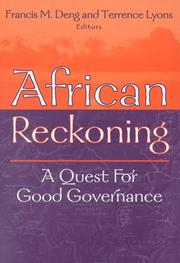
ISBN: 0815717849 Year: 1998 Publisher: Washington, D.C. Brookings Institution
Abstract | Keywords | Export | Availability | Bookmark
 Loading...
Loading...Choose an application
- Reference Manager
- EndNote
- RefWorks (Direct export to RefWorks)
Politics --- Polemology --- Africa
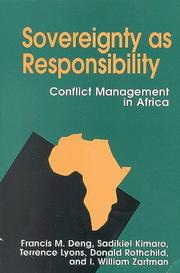
ISBN: 9780815718277 0815718276 0815719736 Year: 2010 Publisher: Washington: Brookings Institution,
Abstract | Keywords | Export | Availability | Bookmark
 Loading...
Loading...Choose an application
- Reference Manager
- EndNote
- RefWorks (Direct export to RefWorks)
The authors assert that sovereignty can no longer be seen as a protection against interference, but as a charge of responsibility where the state is accountable to both domestic and external constituencies. In internal conflicts in Africa, sovereign states have often failed to take responsibility for their own citizens' welfare and for the humanitarian consequences of conflict, leaving the victims with no assistance. This book shows how that responsibility can be exercised by states over their own population, and by other states in assistance to their fellow sovereigns. Sovereignty as Responsibility presents a framework that should guide both national governments and the international community in discharging their respective responsibilities. Broad principles are developed by examining identity as a potential source of conflict, governance as a matter of managing conflict, and economics as a policy field for deterring conflict. Considering conflict management, political stability, economic development, and social welfare as functions of governance, the authors develop strategies, guidelines, and roles for its responsible exercise. Some African governments, such as South Africa in the 1990s and Ghana since 1980, have demonstrated impressive gains against these standards, while others, such as Rwanda, Somalia, Liberia, Nigeria, and Sudan, have failed. Opportunities for making sovereignty more responsible and improving the management of conflicts are examined at the regional and international levels. The lessons from the mixed successes of regional conflict management actions, such as the West African intervention in Liberia, the East African mediation in Sudan, and international effortsto urge talks to end the conflict in Angola, indicate friends and neighbors outside the state in conflict have important roles to play in increasing sovereign responsibility. Approaching conflict management from the perspective of the responsibilities of sovereignty provides a framework for evaluating government accountability. It proposes standards that guide performance and sharpen tools of conflict prevention rather than simply making post-hoc judgments on success or failure. The authors demonstrate that sovereignty as responsibility is both a national obligation and a global imperative.
Conflict management --- Sovereignty --- Africa --- Politics and government --- Conflict management - Africa --- Africa - Politics and government - 1960 --- -Conflict management - Africa --- -Conflict management --- Sovereignty.
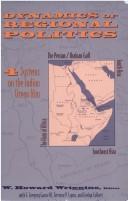
ISBN: 0231078617 Year: 1992 Publisher: New York (N.Y.) Columbia University Press
Abstract | Keywords | Export | Availability | Bookmark
 Loading...
Loading...Choose an application
- Reference Manager
- EndNote
- RefWorks (Direct export to RefWorks)
| Listing 1 - 10 of 19 | << page >> |
Sort by
|

 Search
Search Feedback
Feedback About UniCat
About UniCat  Help
Help News
News